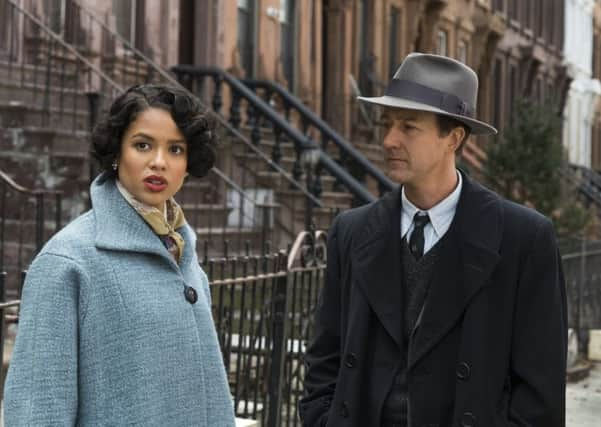Film reviews: Motherless Brooklyn | Honey Boy | Ordinary Love


Motherless Brooklyn (15) ****
Honey Boy (15) ***
Ordinary Love (12A) ***
Edward Norton returns to the big screen in a big way with Motherless Brooklyn, a wonderfully labyrinthine detective movie about a Tourette’s syndrome sufferer (Norton) trying to find out who killed his boss amid the municipal power struggles of post-war New York. Directed and adapted by Norton from Jonathan Lethem’s acclaimed novel of the same name, the film sees him take on his first lead role in a decade and one of the many pleasures of what follows is getting the chance to see an actor of his stature playing a fascinating character whose brain functions in a way that makes him oddly suited to the job he’s fallen into. This is Lionel Essrog, one of several employees of Frank Minna (Bruce Willis), a tough-guy gumshoe whom we learn took Lionel under his wing as an orphaned kid, recognising his disorder as a potential strength – and inspiring Lionel’s undying loyalty and devotion in return.
This being the late 1950s, Lionel doesn’t have the terminology for his compulsive tics, but we see the way he works hard to keep himself from involuntarily touching people and blurting out random phrases, something Norton uses not just to carefully temper his own performance, but to show us how the micro-repetitions that form a necessary part of Lionel’s daily life – enabling him, in effect, to function in the world – have fine-tuned his memory and made him a more tenacious private-eye with a rigorous attention to detail. When Frank is killed while shadowing a shady client, the obsessive part of Lionel’s brain starts working overtime, patching together a few snatches of overheard dialogue and the few clues Frank has left behind into the beginnings of a major conspiracy involving a tyrannical city planner intent on reshaping New York in his own racist image.
Advertisement
Hide AdPlayed by a stout and ferocious Alec Baldwin, the latter is named Moses Randolph, a clear reference to Robert Moses, the real-life public official responsible for ripping apart New York’s ethnically diverse neighbourhoods and displacing their citizens to high-rise housing projects with little or no access to the parks, beaches and highways he was praised for creating. Having transposed the novel’s 1990s setting to 1957, Norton weaves a fictionalised version of this crucial period in the city’s history into the fabric of the film’s plot as Lionel’s investigation leads him to jazz-club owner Billy Rose (Robert Wisdom) and his daughter Laura (Gugu Mbatha-Raw), a young black law graduate working for Cherry Jones’s Jane Jacobs-esque community activist.
There are clear and deliberate echoes of Chinatown and LA Confidential here in the way Motherless Brooklyn uses the noir genre to explore the creation of a modern city; in fact the film often plays like an East Coast version of both, which is no bad thing. Like those films, Norton’s approach to history is thoroughly modern. He veers fluidly from hard-boiled realism to expressionistic flights of fancy, tapping into the dominant creative modes of the era in ways that allow him to pay close attention to period detail while avoiding the traps of pastiche. He makes especially good use of both Daniel Pemberton’s jazzy score and Thom Yorke’s melancholic songs to tune us in to the free-form way Lionel makes sense of the chaos of a world in which tycoons run roughshod over every law and every citizen that stands in their way.
As an actor, Shia LaBeouf looked as if he’d pulled the pin on his career. Having broken through as an in-demand and clearly talented child star, his transition to an adult career with the Transformers films and Indiana Jones and the Crystal Skull seemed to put him on course for the sort of movie star success that can be sustained for decades. Then came the high profile arrests, plagiarism accusations and his paper-bag-over-the-head performance art provocations, all of which overshadowed his attempts to be taken seriously when he started pursuing more artistically minded movies. The semi-autobiographical Honey Boy, however, goes some way to explaining his tabloid-baiting behaviour. Artfully directed by Alma Har’el (Bombay Beach), and marking LaBeouf’s feature debut as a screenwriter, it’s a rehab story in which an off-the-rails movie star (Lucas Hedges) recalls his youth as a child actor managed by an irresponsible father. Though rehab stories and father-son stories are ten-a-penny, this one distinguishes itself with insider details about the darker side of Hollywood and achieves an extra biographical frisson by casting LaBeouf as a fictionalised version of his own father.
Serious illness and Christmas combine in Ordinary Love, a low-key seasonal drama about a middle-aged couple, Joan and Tom (Leslie Manville and Liam Neeson), forced to confront the reality of breast cancer at a stage in their lives when their marriage seems to have settled into a kind of resigned affection. The earlier loss of a daughter might be in part to blame for the comforting air of banality that defines their lives – sorrow certainly seems to haunt them in ways they can’t articulate, but they’ve got through it somehow, and the film is at least partly an exploration of how the cost of such resilience may very well be a necessary dulling of the senses, something thrown into sharp relief by Joan’s diagnosis. Manville is particularly impressive here, delivering a transformative performance devoid of the showiness that lesser actors might milk for awards consideration. ■